#Peter Kellner
Explore tagged Tumblr posts
Text

14 November 2012 | Queen Elizabeth II meets Royal Commonwealth Society Chairman Peter Kellner during her visit to the Royal Commonwealth Society in London, England. (c) Ian Gavan/WPA Pool/Getty Images
2 notes
·
View notes
Text
The Red Wall. Polling analysis.
0 notes
Text
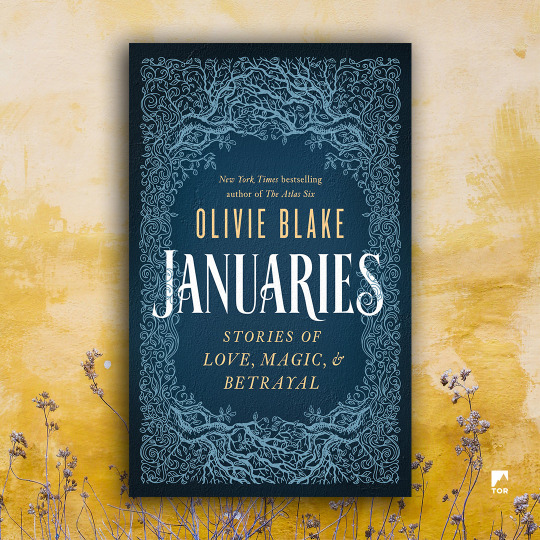
Love. Magic. Betrayal.
Januaries—a stunning new short story and novella collection from bestselling author Olivie Blake!
Dive into stories of twisted fairytales, contemporary heists, absurdist poetry, and at least one set of actual wedding vows.
87 notes
·
View notes
Text
youtube
Johann Peter Kellner (1705-1772) - Lass es Jesu dich erbarmen: III. So klag auch ich
Artist: Mirko Ludwig
Ensemble: Capella Thuringia, Conductor: Bernhard Klapprott
1 note
·
View note
Text
VALE 2024


















Jackie Crockett, Virgil, Francisco Ciatso, Yutaka Yoshie, Butcher Vachon, Ole Anderson, Anthony Gaines, Chris Markoff, Pequeño Dragón, Asahi, Peter Flowers, Ian Muir, Dario Romero, Edmund Jones, Peggy Gilbert, Silver Cat, John Burke...
Rey Destroller, James Staublen, Pompin, Kamaleon Negro, Chicho De Catanzaro, Ferrarito, La Hormiga Atomica, Akebono, Ice Train, Jim Casey, Freddy Adams, Mervyn McKee, Jermaine Robinson, George Wilhelm, Big Mac, Bad Bones...
Bob Bruggers, Silento Rodriguez, Billy Reil, Rainbow Brown, Tony Jones, Scott Cornish, El Signo, Santana Starks, Jonathan Morton, Dave Sims, Reggie Rage, X-Boy, Scott Henson, Willy Estrada, James Castle, Jamie Kellner, Horror, Tequilita...
Sordomudo Rodriguez, Wild Samoan Sika, Gunter Zapf, Bill Custers, Vaquero Jr, Pequeño Nitro, Chase Pearce, Leo Burke, Pete Sanchez, Vladimir Petrov, Beauregarde, Mark Gordy, Bulldog Dan Hansen, Al Zinck, Loco Valentino, Horror...
Kevin Sullivan, Wild Samoan Afa, Fritz Von Goering, Rey Komodo, Villano V, Donn Wingate, Pete Reeves, Vince Austin, Jersey Joe Walchik, Joey Nuggs, Kuniaki Kobayashi, Micah Taylor, Pete Rose, Charlie Laird, Tauro, Asesino Negro...
Sid Vicious, Liger Rivera, Martin N, Tito Senza, Al DeRusha, Roger Baker, Roy Calavera, Brian Maxine, Darling Dagmar, Miss Peaches (Starr), Jonathan Sayers, Gail "Sheena" Stirling, Scott L. Schwartz, CC Star, Joe Koff, Mighty Inoue...
Sonny King, Rickey Rowland, Dennis Brent, Bulldog Villegas, Hot Rod Biggs, Barry Douglas, Eyan Brisco, Al Rojo Vivo, Billy Blue River, Ernest "Frenchy" Rheault, Tommy Savoldi, Rey Misterio Sr, Jax Dane, Karloff LaGarde Jr, Coloso Colosetti, Steve Estes, Sweet Daddy Siki and Jimmy Carter.
#wrestling#pro wrestling#wwe#nwa#wcw#nwo#aew#ecw#njpw#wxw#celebrity news#cmll#lucha libre aaa#vale#breaking news
16 notes
·
View notes
Text
Court Circular | 17th June 2024
Windsor Castle
The King, accompanied by The Queen, The Prince of Wales, The Duke of York, The Duke of Edinburgh, The Princess Royal, The Duke of Gloucester, and The Duke of Kent today held a Chapter of the Most Noble Order of the Garter in the Throne Room, Windsor Castle.
The Duchess of Edinburgh and Vice Admiral Sir Tim Laurence were present.
The Duchess of Gloucester and the Lord Lloyd-Webber, the Lord Kakkar and Air Chief Marshal the Lord Peach were present.
The following Knights Companion were present: the Duke of Abercorn, the Lord Butler of Brockwell, the Rt Hon Sir John Major, the Lord Luce, the Lord Phillips of Worth Matravers, Marshal of the Royal Air Force the Lord Stirrup, the Lady Manningham Buller, the Lord King of Lothbury, the Lord Shuttleworth, the Viscount Brookeborough, Lady Mary Fagan, the Marquess of Salisbury, Lady Mary Peters, the Baroness Amos, the Rt Hon Sir Tony Blair and the Baroness Ashton of Upholland.
The Officers of the Order were: the Bishop of Winchester (Prelate), the Dean of Windsor (Register), Mr David White (Garter King of Arms), Miss Sarah Clarke (Lady Usher of the Black Rod) and Lieutenant Colonel Stephen Segrave (Secretary).
The Hon Guy Tryon (Page of Honour) and Mr Charles van Cutsem (Page of Honour) were in attendance.
His Majesty invested The Duchess of Gloucester with the Insignia of a Lady of the Most Noble Order of the Garter and the Lord Lloyd-Webber, the Lord Kakkar and Air Chief Marshal the Lord Peach with the Insignia of a Knight Companion of the Most Noble Order of the Garter.
The King later gave a Luncheon Party for the Companions of the Most Noble Order of the Garter at which The Queen, The Prince of Wales, The Duke of York, The Duke and Duchess of Edinburgh, The Princess Royal and Vice Admiral Sir Tim Laurence, The Duke and Duchess of Gloucester, and The Duke of Kent were present.
The following had the honour of being invited: the Duke of Abercorn and the Lady Sophie Hamilton, the Lord and Lady Butler of Brockwell, the Rt Hon Sir John Major and Dame Norma Major, the Lord Luce, the Lord and Lady Phillips of Worth Matravers, Marshal of the Royal Air Force the Lord and Lady Stirrup, the Baroness Manningham-Buller and Miss Lilah Parsons, the Lord and Lady King of Lothbury, the Viscount and Viscountess Brookeborough, Lady Mary Fagan and Captain Christopher Fagan, the Marquess and Marchioness of Salisbury, Lady Mary Peters and Mrs Susan Gaunt, the Rt Hon Sir Tony and Lady Blair, the Baroness Amos and Ms Colleen Amos, the Baroness Ashton of Upholland and Mr Peter Kellner, the Lord and Lady Patten of Barnes, the Lord and Lady Lloyd-Webber, the Lord and Lady Kakkar, Air Chief Marshal the Lord and Lady Peach, the Bishop of Winchester, the Dean of Windsor, Mr David White, Miss Sarah Clarke, Lieutenant Colonel Stephen Segrave, the Hon Guy Tryon and Mr Charles van Cutsem.
An Installation Service was held in St George’s Chapel this afternoon at which The Duchess of Gloucester was installed as a Lady of the Most Noble Order of the Garter and the Lord Lloyd-Webber, the Lord Kakkar and Air Chief Marshal the Lord Peach were installed as Knights Companion of the Most Noble Order of the Garter.
His Majesty’s Body Guard of the Honourable Corps of Gentlemen at Arms and The King’s Body Guard of the Yeomen of the Guard were on duty in the Chapel.
#king charles iii#queen camilla#william prince of wales#prince edward duke of edinburgh#sophie duchess of edinburgh#princess anne#princess royal#tim laurence#timothy laurence#prince richard duke of gloucester#birgitte duchess of gloucester#prince edward duke of kent#court circular
10 notes
·
View notes
Text
THE 236 GREATEST PERSONALITIES IN THE ENTIRE KNOWN HISTORY/COLLECTIVE CONSCIOUSNESS OF THIS WORLD! (@INDIES)
ie. THE 236 GREATEST PERSONALITIES IN WORLD HISTORY! (@INDIES)
Rajesh Khanna
Lionel Messi
Leonardo Da Vinci
Online Indie
Muhammad Ali
Joan of Arc
William Shakespeare
Vincent Van Gogh
J. K. Rowling
David Lean
Nadia Comaneci
Diego Maradona
Wolfgang Amadeus Mozart
Meena Kumari
Julius Caesar
Harrison Ford
Ludwig Van Beethoven
William W. Cargill
Fritz Hoffmann-La Roche
Samuel Curtis Johnson
Sam Walton
John D. Rockefeller
Andrew Carnegie
Roy Thomson
Tim Berners-Lee
Marie Curie
James J. Hill
Cornelius Vanderbilt
Roman Polanski
Samuel Slater
J. P. Morgan
Cary Grant
Dmitri Mendeleev
John Harvard
Alain Delon
Ramakrishna Paramhansa (Official God)
The Lumiere Brothers, Auguste & Louis
Carl Friedrich Benz
Michelangelo
Maharishi Mahesh Yogi
Ramana Maharishi
Mark Twain
Swami Sri Yukteswar Giri
Bruce Lee
Bhagwan Krishna (Official God)
Charlemagne
Rene Descartes
John F. Kennedy
Bhagwan Ganesha (Official God)
Walt Disney
Albert Einstein
Nikola Tesla
Alfred Hitchcock
Pythagoras
William Randolph Hearst
Cosimo de’ Medici
Johann Sebastian Bach
Alec Guinness
Nostradamus
Christopher Plummer
Archimedes
Jackie Chan
Guru Dutt
Amma Karunamayi/ Mata Parvati (Official God)
Peter Sellers
Gerard Depardieu
Joseph Safra
Robert Morris
Sean Connery
Petr Kellner
Aristotle Onassis
Usain Bolt
Jack Welch
Alfredo di Stefano
Elizabeth Taylor
Michael Jordan
Paul Muni
Steven Spielberg
Louis Pasteur
Ingrid Bergman
Norma Shearer
Dr. B. R. Ambedkar
Ayn Rand
Jesus Christ (Official God)
Luciano Pavarotti
Alain Resnais
Frank Sinatra
Allah (Official God)
Richard Nixon
Charlie Chaplin
Thomas Alva Edison
Alexander Graham Bell
Wright Brothers
Arjun (of Bhagwan Krishna’s Gita)
Jim Simons
George Lucas
Swami Sri Lahiri Mahasaya
Carl Lewis
Brett Favre
Helen Keller
Bernard Mannes Baruch
Buddha (Official God)
Hugh Grant
K. L. Saigal
Roger Federer
Rash Behari Bose
Tiger Woods
William Blake
Jesse Owens
Claude Miller
Bernardo Bertolucci
Subhash Chandra Bose
Satyajit Ray
Hippocrates
Chiang Kai-Shek
John Logie Baird
Geeta Dutt
Raphael (painter)
Bhagwan Shiva (Official God)
Radha (Ancient Krishna devotee)
George Orwell
Jorge Paulo Lemann
Catherine Deneuve
Pierre-Auguste Renoir
Bill Gates
Bhagwan Ram (Official God)
Michael Phelps
Michael Faraday
Audrey Hepburn
Dalai Lama
Grace Kelly
Mikhail Gorbachev
Vladimir Putin
Galileo Galilei
Gary Cooper
Roger Moore
John Huston
Blaise Pascal
Humphrey Bogart
Rudyard Kipling
Samuel Morse
Wayne Gretzky
Yogi Berra
Barry Levinson
Patrice Chereau (director)
Jerry Lewis
Louis Daguerre
James Watt
Henri Rousseau
Nikita Krushchev
Jack Dorsey
Dev Anand
Elia Kazan
Alexander Fleming
David Selznick
Frank Marshall
Viswanathan Anand
Major Dhyan Chand
Swami Vivekananda
Felix Rohatyn
Sam Spiegel
Anand Bakshi
Victor Hugo
Bhagwan Sri Sathya Sai Baba (Official God)
Steve Jobs
Srinivasa Ramanujam
Lord Hanuman
Stanley Kubrick
Giotto
Voltaire
Diego Velazquez
Ernest Hemingway
Francis Ford Coppola
Michael Douglas
Kirk Douglas
Mario Lemieux
Kishore Kumar
James Stewart
Douglas Fairbanks
Confucius
Babe Ruth
Raj Kapoor
Titian aka Tiziano Vecelli
El Greco
Francisco de Goya
Jim Carrey
Mohammad Rafi
Steffi Graf
Pele
Gustave Courbet
Rani Laxmibai of Jhansi
Milos Forman
Steve Wozniak
Georgia O’ Keeffe
Mala Sinha
Aryabhatta
Magic Johnson
Patanjali
Leo Tolstoy
Tansen
Henry Fonda
Albrecht Durer
Benazir Bhutto
Cal Ripken Jr
Samuel Goldwyn
Mumtaz (actress)
Panini
Nicolaus Copernicus
Pablo Picasso
George Clooney
Olivia de Havilland
Prem Chand
Imran Khan
Pete Sampras
Ratan Tata
Meerabai (16th c. Krishna devotee)
Queen Elizabeth II
Pope John Paul II
James Cameron
Jack Ma
Warren Buffett
Romy Schneider
C. V. Raman
Aung San Suu Kyi
Benjamin Netanyahu
Frank Capra
Michael Schumacher
Steve Forbes
Paramhansa Yogananda
Tom Hanks
Kamal Amrohi
Hans Holbein
Shammi Kapoor
Gerardus Mercator
Edith Piaf
Bhagwan Shirdi Sai Baba (Official God) .
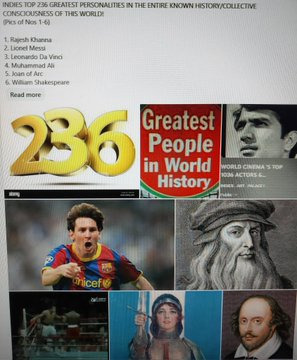
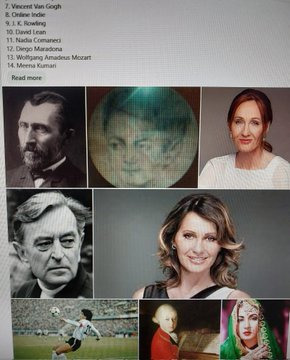
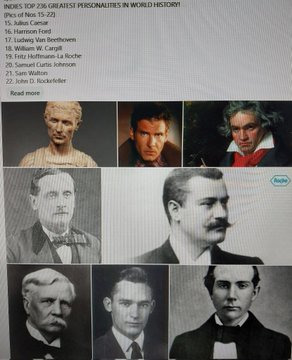
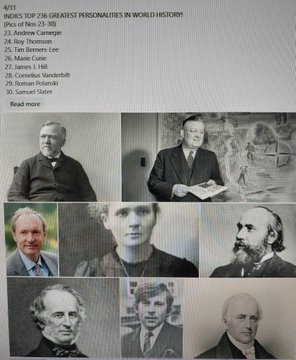
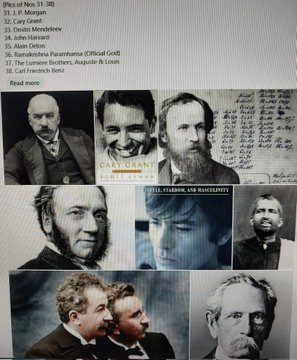

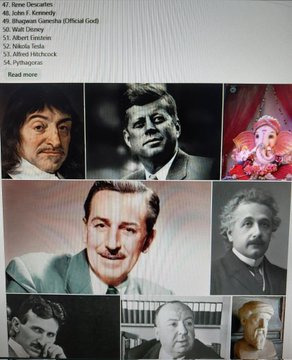
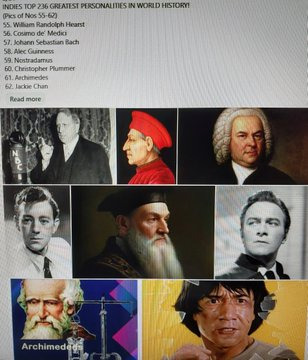
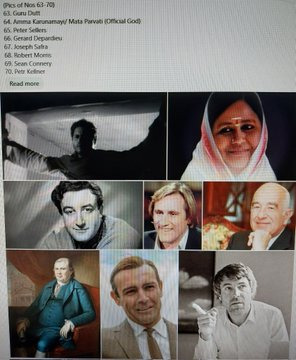
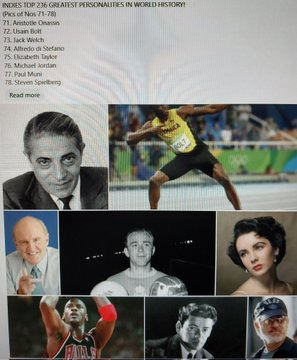
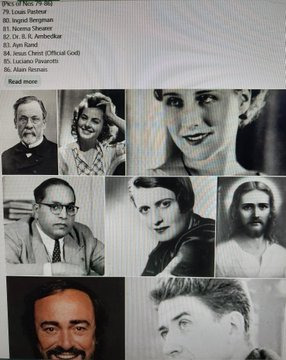
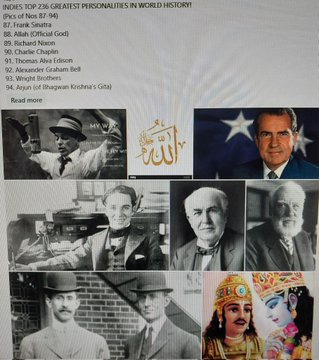
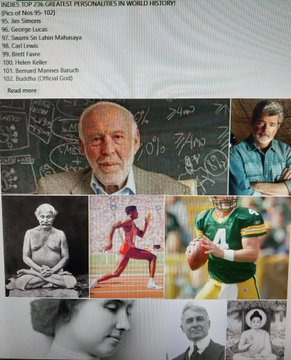
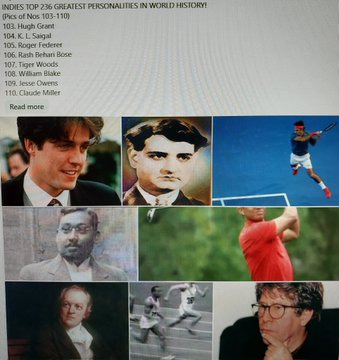
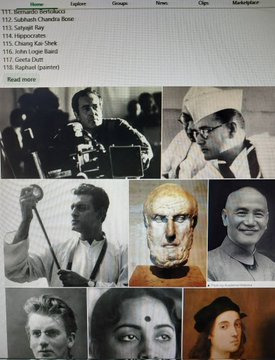
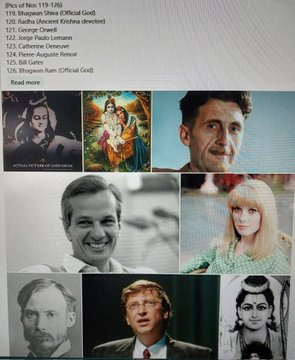
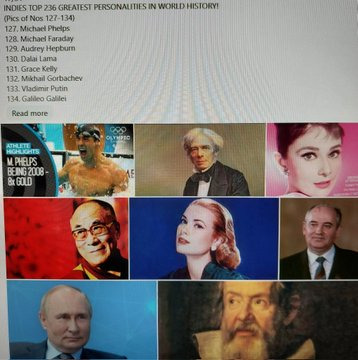
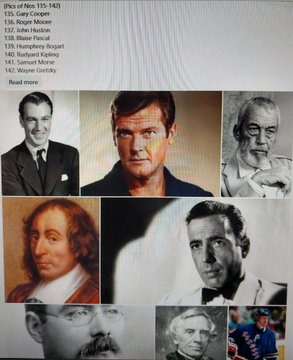
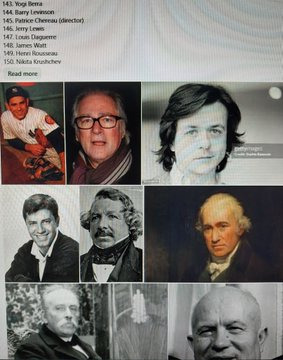
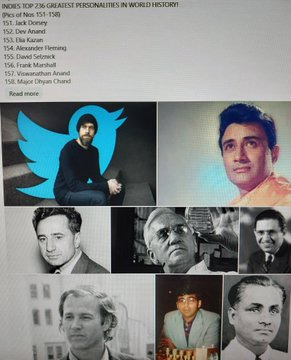
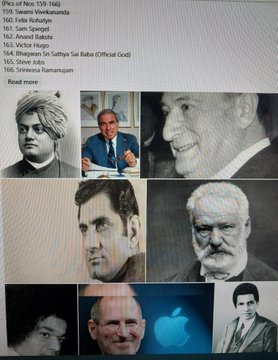
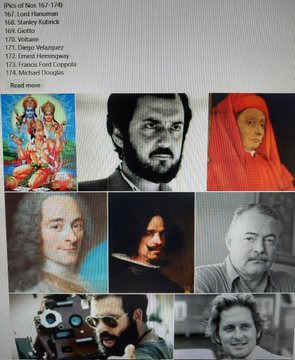

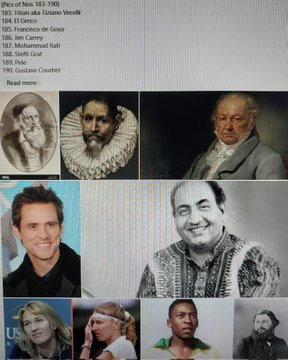
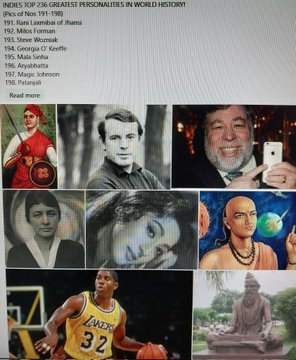
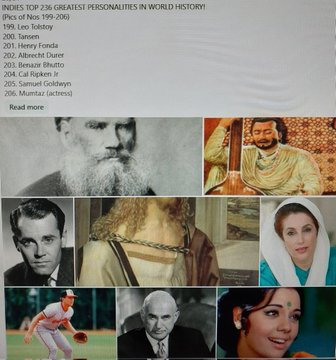
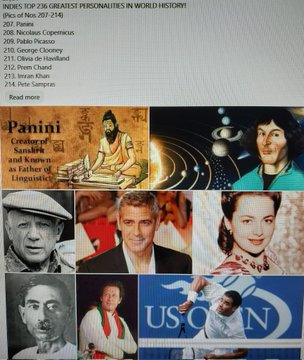
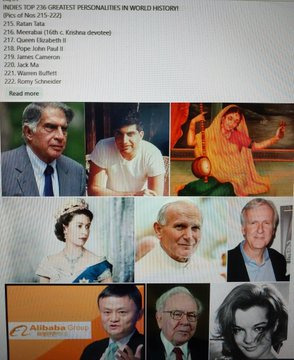
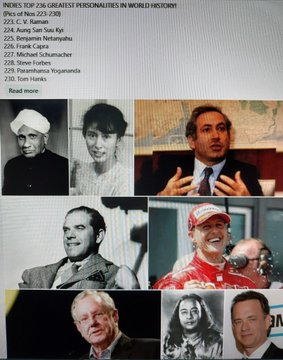
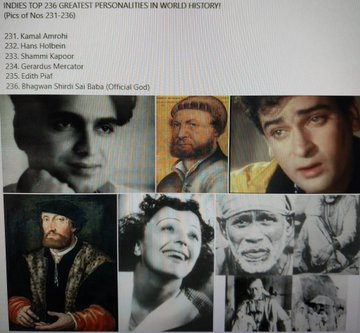
2 notes
·
View notes
Text
THE 236 GREATEST PERSONALITIES IN THE ENTIRE KNOWN HISTORY/COLLECTIVE CONSCIOUSNESS OF THIS WORLD! (@INDIES)
i.e. THE 236 GREATEST PERSONALITIES IN WORLD HISTORY! (@INDIES)
Rajesh Khanna
Lionel Messi
Leonardo Da Vinci
Muhammad Ali
Joan of Arc
William Shakespeare
Vincent Van Gogh
Online Indie
J. K. Rowling
David Lean
Nadia Comaneci
Diego Maradona
Wolfgang Amadeus Mozart
Meena Kumari
Julius Caesar
Harrison Ford
Ludwig Van Beethoven
William W. Cargill
Fritz Hoffmann-La Roche
Samuel Curtis Johnson
Sam Walton
John D. Rockefeller
Andrew Carnegie
Roy Thomson
Tim Berners-Lee
Marie Curie
James J. Hill
Cornelius Vanderbilt
Roman Polanski
Samuel Slater
J. P. Morgan
Cary Grant
Dmitri Mendeleev
John Harvard
Alain Delon
Ramakrishna Paramhansa (Official God)
The Lumiere Brothers, Auguste & Louis
Carl Friedrich Benz
Michelangelo
Maharishi Mahesh Yogi
Ramana Maharishi
Mark Twain
Swami Sri Yukteswar Giri
Bruce Lee
Bhagwan Krishna (Official God)
Charlemagne
Rene Descartes
John F. Kennedy
Bhagwan Ganesha (Official God)
Walt Disney
Albert Einstein
Nikola Tesla
Alfred Hitchcock
Pythagoras
William Randolph Hearst
Cosimo de’ Medici
Johann Sebastian Bach
Alec Guinness
Nostradamus
Christopher Plummer
Archimedes
Jackie Chan
Guru Dutt
Amma Karunamayi/ Mata Parvati (Official God)
Peter Sellers
Gerard Depardieu
Joseph Safra
Robert Morris
Sean Connery
Petr Kellner
Aristotle Onassis
Usain Bolt
Jack Welch
Alfredo di Stefano
Elizabeth Taylor
Michael Jordan
Paul Muni
Steven Spielberg
Louis Pasteur
Ingrid Bergman
Norma Shearer
Dr. B. R. Ambedkar
Ayn Rand
Jesus Christ (Official God)
Luciano Pavarotti
Alain Resnais
Frank Sinatra
Allah (Official God)
Richard Nixon
Charlie Chaplin
Thomas Alva Edison
Alexander Graham Bell
Wright Brothers
Arjun (of Bhagwan Krishna’s Gita)
Jim Simons
George Lucas
Swami Sri Lahiri Mahasaya
Carl Lewis
Brett Favre
Helen Keller
Bernard Mannes Baruch
Buddha (Official God)
Hugh Grant
K. L. Saigal
Roger Federer
Rash Behari Bose
Tiger Woods
William Blake
Jesse Owens
Claude Miller
Bernardo Bertolucci
Subhash Chandra Bose
Satyajit Ray
Hippocrates
Chiang Kai-Shek
John Logie Baird
Geeta Dutt
Raphael (painter)
Bhagwan Shiva (Official God)
Radha (Ancient Krishna devotee)
George Orwell
Jorge Paulo Lemann
Catherine Deneuve
Pierre-Auguste Renoir
Bill Gates
Bhagwan Ram (Official God)
Michael Phelps
Michael Faraday
Audrey Hepburn
Dalai Lama
Grace Kelly
Mikhail Gorbachev
Vladimir Putin
Galileo Galilei
Gary Cooper
Roger Moore
John Huston
Blaise Pascal
Humphrey Bogart
Rudyard Kipling
Samuel Morse
Wayne Gretzky
Yogi Berra
Barry Levinson
Patrice Chereau (director)
Jerry Lewis
Louis Daguerre
James Watt
Henri Rousseau
Nikita Krushchev
Jack Dorsey
Dev Anand
Elia Kazan
Alexander Fleming
David Selznick
Frank Marshall
Viswanathan Anand
Major Dhyan Chand
Swami Vivekananda
Felix Rohatyn
Sam Spiegel
Anand Bakshi
Victor Hugo
Bhagwan Sri Sathya Sai Baba (Official God)
Steve Jobs
Srinivasa Ramanujam
Lord Hanuman
Stanley Kubrick
Giotto
Voltaire
Diego Velazquez
Ernest Hemingway
Francis Ford Coppola
Michael Douglas
Kirk Douglas
Mario Lemieux
Kishore Kumar
James Stewart
Douglas Fairbanks
Confucius
Babe Ruth
Raj Kapoor
Titian aka Tiziano Vecelli
El Greco
Francisco de Goya
Jim Carrey
Mohammad Rafi
Steffi Graf
Pele
Gustave Courbet
Rani Laxmibai of Jhansi
Milos Forman
Steve Wozniak
Georgia O’ Keeffe
Mala Sinha
Aryabhatta
Magic Johnson
Patanjali
Leo Tolstoy
Tansen
Henry Fonda
Albrecht Durer
Benazir Bhutto
Cal Ripken Jr
Samuel Goldwyn
Mumtaz (actress)
Panini
Nicolaus Copernicus
Pablo Picasso
George Clooney
Olivia de Havilland
Prem Chand
Imran Khan
Pete Sampras
Ratan Tata
Meerabai (16th c. Krishna devotee)
Queen Elizabeth II
Pope John Paul II
James Cameron
Jack Ma
Warren Buffett
Romy Schneider
C. V. Raman
Aung San Suu Kyi
Benjamin Netanyahu
Frank Capra
Michael Schumacher
Steve Forbes
Paramhansa Yogananda
Tom Hanks
Kamal Amrohi
Hans Holbein
Shammi Kapoor
Gerardus Mercator
Edith Piaf
Bhagwan Shirdi Sai Baba (Official God)
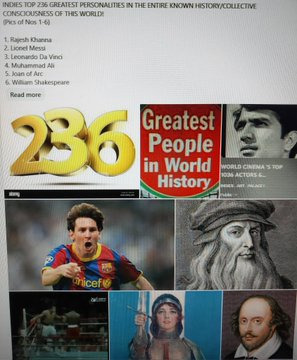


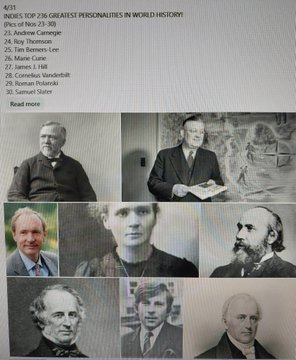
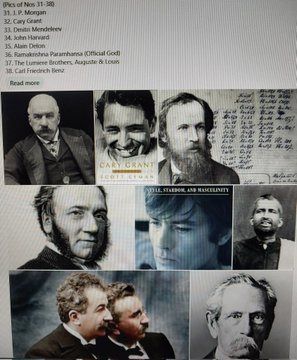
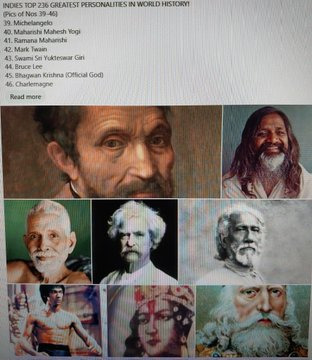
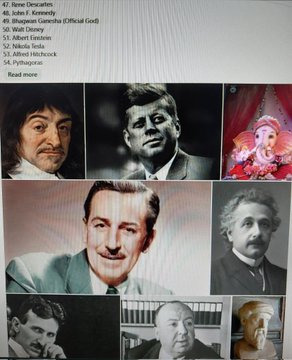
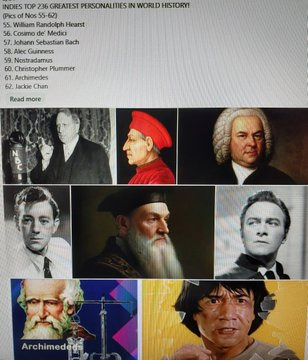
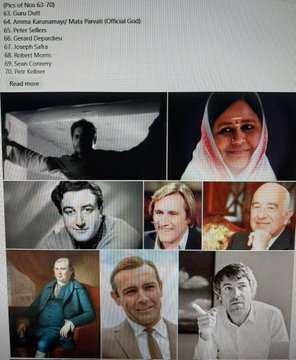
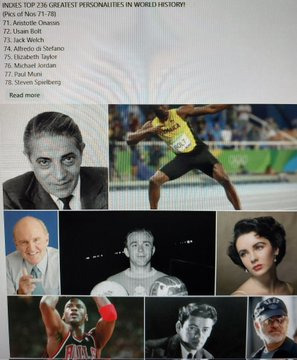
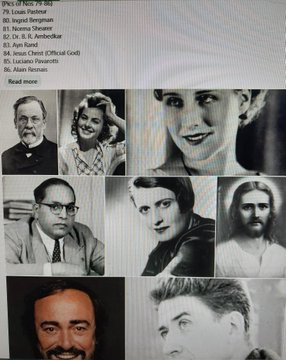
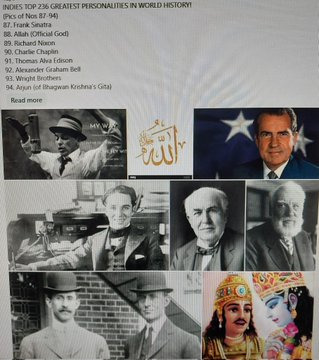
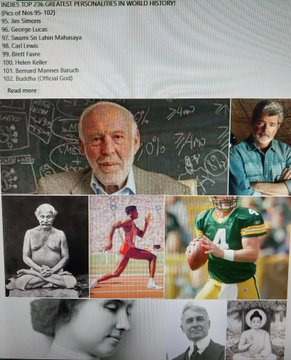
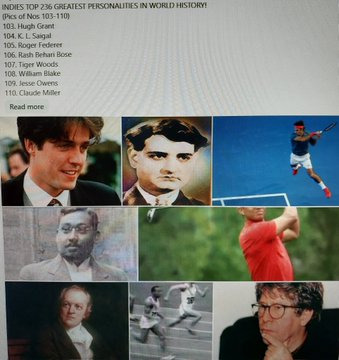
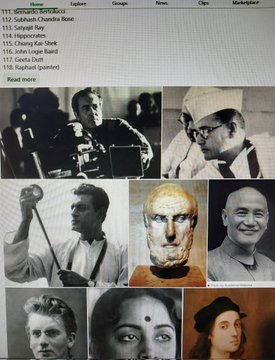
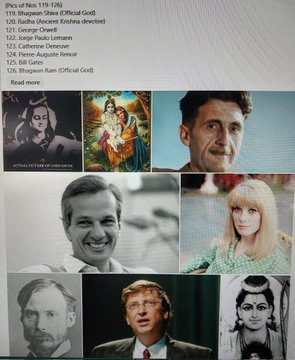
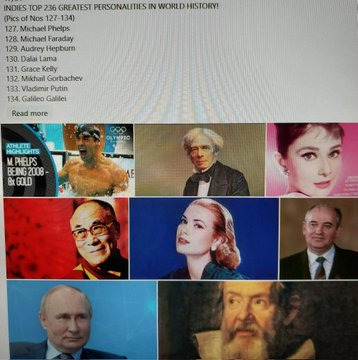
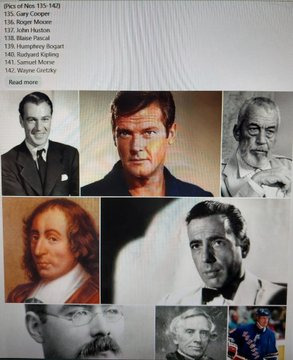
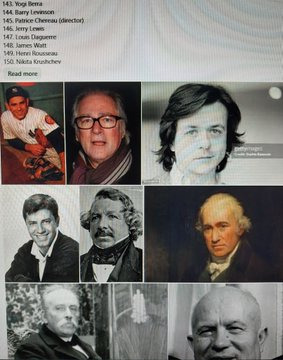
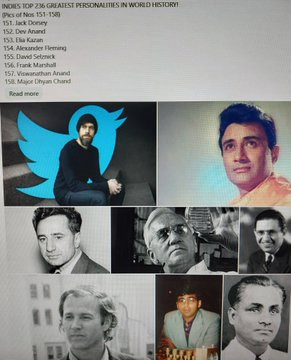
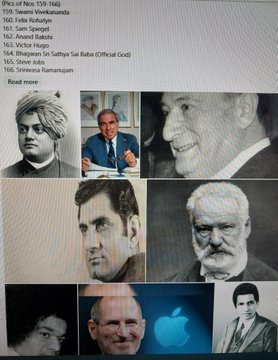
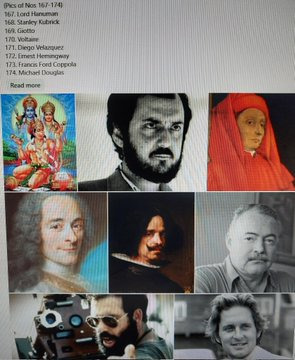

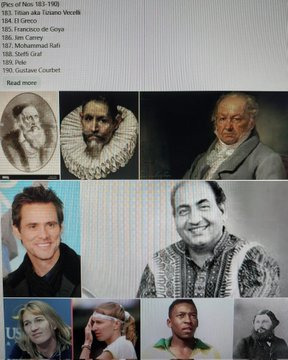
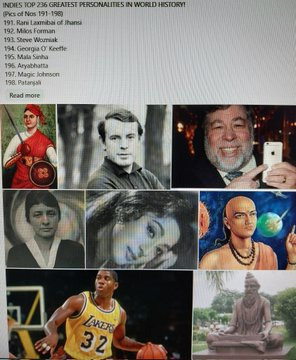
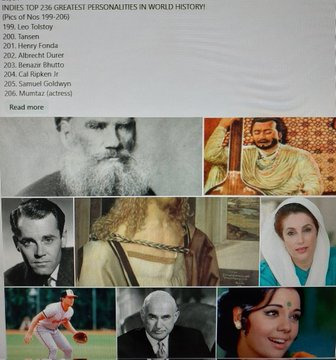

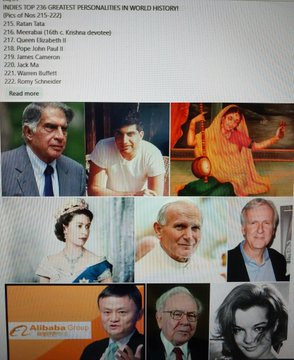
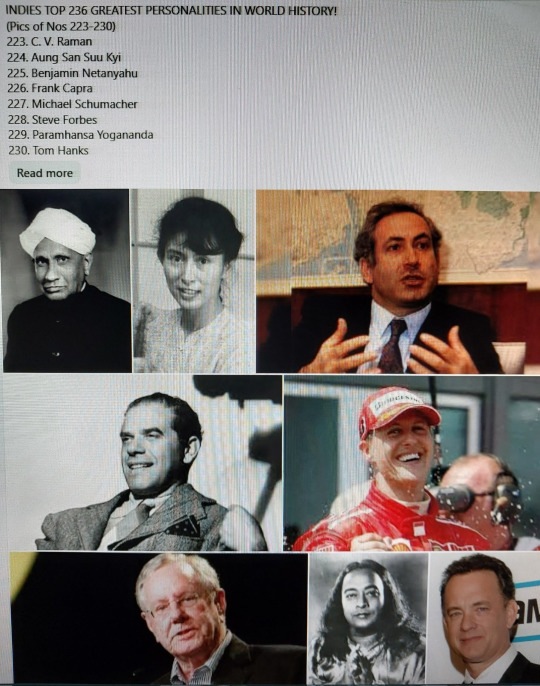
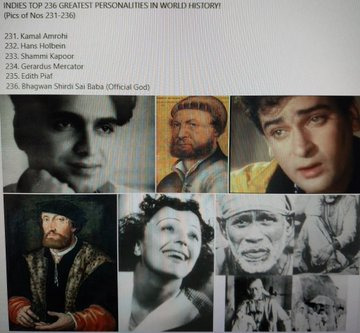
4 notes
·
View notes
Text
2024 in memoriam (part 23)






























Nancy MacKenzie, 81
(Anthony) Mike Brumley, 62
Archbishop Roberto Lückert León, 84
Bishop Marcelo Martorell, 79
Evans Evans Frankenheimer, 91
Hiram Kasten, 71
Donna Theodore Martin, 82
Gen. Claudio Graziano, 70
Maj. Gen. James E. Paschall, 101
Bishop Daniel Patrick Reilly, 96
Rosalio Martires, 77
Willie Mays; Jr., 93
Bishop José Ángel Rovai, 87
Sylvia Infantas, 101
Dave Williams, 78
Peter B. Gillis, 71
Donald Sutherland, 88
Dave Gatherum, 92
Greg Larson, 84
Dylon Powley, 27
Haviland Smith, 94
Taylor Wily, 56
Archbishop Gianfranco Gardin, 80
James K. Irving, 96
Darren Lewis, 55
Romay Davis, 104
Dr. Frederick Crews, 91
Kåre Karlsson, 100
Jamie Kellner, 77
Abbot Fr. Nikolay Kotelnikov, 66
#Religion#Tributes#Celebrities#TV Shows#Peru#Mexico#Sports#Baseball#Oklahoma#Mississippi#Venezuela#Argentina#Movies#West Virginia#Music#Italy#North Carolina#Oregon#Rhode Island#Massachusetts#Basketball#Politics#The Philippines#Alabama#Chile#Football#Iowa#Florida#Books#Comics
1 note
·
View note
Link
0 notes
Link
0 notes
Text
Fundstück
Peter Tschaikowsky Erinnerungen eines Musikers
Ich reiste am 15. Dezember des Jahres 1887 von Petersburg ab und kam am 17. (29.) Dezember in Berlin an. Der Vorstand der Berliner Philharmonischen Gesellschaft hatte bereits schriftlich mit mir über das Konzert, das unter meiner Leitung stattfinden sollte, verhandelt, indessen war eine persönliche Zusammenkunft erforderlich, um das Programm zusammenzustellen. Dies bereitete nicht geringe Schwierigkeiten, weil die Direktion sich bemühte, dem Geschmack des Berliner Publikums Rechnung zu tragen und gar nicht in Übereinstimmung mit meiner Wahl diejenigen Stücke wünschte, die ich nicht wollte, und solche vom Programm strich, auf die ich am meisten hielt und die, von dem ausgezeichneten Berliner Orchester vorgetragen, mich als Komponist von der besten Seite gezeigt hätten. Die mündliche Verhandlung wurde indessen aus folgenden Gründen vereitelt: Als mir am Morgen meiner Ankunft der Kellner zusammen mit dem Frühstück eine Berliner Zeitung brachte, las ich zu meiner nicht geringen Überraschung folgende Notiz: »Heute, am 29.Dezember, trifft der bekannte russische Komponist Tschaikowsky in Berlin ein. Zahlreiche Freunde und Verehrer beabsichtigen, ihn im Restaurant von X. um so und soviel Uhr durch einen Frühschoppen zu ehren.« ... Nach Empfang dieses Briefes hatte ich sofort an Herrn N. telegraphiert, man möge durchaus von dieser geplanten Aufmerksamkeit Abstand nehmen, da ich auf keinen Fall erscheinen würde. Aus der Zeitung ersah ich nun aber, daß Herr N. trotzdem diesen Begrüßungsakt inszeniert und sogar meine Ankunft in der Presse bekanntgemacht hatte. Zum Glück wußte Herr N. nicht, in welchem Hotel ich abgestiegen war, und ich beschloß daher, einen Tag verstreichen zu lassen, bevor ich ihn von meiner Ankunft in Berlin in Kenntnis setzte. Ich darf wohl annehmen, daß die Leser begreifen, warum das Verfahren des Agenten mich in Unruhe und Schrecken versetzte. Er wünschte gewiß aufrichtig, mir einen Dienst zu erweisen, wählte aber recht eigentümliche Mittel dazu. Für diejenigen Leser, die mit den Beziehungen des ausländischen Publikums zu russischen Komponisten nicht vertraut sind, will ich bemerken, daß ich in Berlin nicht nur keine zahlreichen Anhänger habe, sondern daß man sogar meine Musik dort recht wenig kennt oder wenigstens früher nicht kannte. Einige meiner symphonischen Werke waren zwar zuweilen in Berlin gespielt worden, – Kapellmeister Bilse z. B. hat in seinen volkstümlichen Konzerten das beliebte Andante aus meinem Quartett häufig zum Vortrag gebracht – aber darauf beschränkte sich auch die Bekanntschaft der Berliner mit meinen Werken. Von den angeblichen zahlreichen Freunden und Verehrern in der mir völlig fremden deutschen Reichshauptstadt kannte ich nur den Chef der Firma Bote & Bock, Herrn Hugo Bock, und was die Beurteilung meiner Werke in der Presse angeht, konnte von einem einmütigen Lobe keine Rede sein. Der Einfall des Agenten N., für mich in Berlin ein Festbankett zu veranstalten, charakterisiert so recht die früher von mir schon gerügte Sonderbarkeit und leichtsinnige Handlungsweise dieses Menschen, der sich einbildete, auf diesem Wege meinen Namen beim deutschen Publikum populär machen zu können. Die Folge dieses Vorgangs war, daß ich mich in Berlin gleichsam beschämt fühlte. Es schien mir, als sei ich für die gesamten Berliner Musikerkreise ein Gegenstand des Spottes, weil man glauben könnte, daß ich mit Hilfe des Herrn N. die mir zugedachte Ehrung selbst veranlaßt hätte. Ich hatte nur den einen Wunsch, in der deutschen Hauptstadt niemanden zu sehen und zu sprechen, und nachdem ich am andern Morgen mit Herrn N. eine gründliche Auseinandersetzung gehabt und mit meinem Freunde Demidow, der damals auf der Durchreise in Berlin war, ein fröhliches Wiedersehen gefeiert hatte, reiste ich in aller Stille nach Leipzig ab, um von hier aus meine Künstlerfahrt durchs westliche Europa beginnen
In deutscher Übertragung und in Auswahl mit einer Einleitung herausgegeben von Heinrich Stümcke
Verlag von Philipp Reclam jun. Leipzig
1922
Neue durchgesehene und vermehrte Ausgabe
Druck von Philipp Reclam jun. in Leipzig
0 notes
Text
The end of Astronauts, Robotic Space Missions and Our Future on Earth & Beyond
By Martin Rees
This book is about how robots are the best option for space exploration -Mars-, asteroid mining or research. There are several reasons such as cost: sending humans is very expensive as they would need 200-day provisions and spend extra money on making launching more secure.
It talks about robots that had been sent to space, like Perseverance which had enough AI to diverse if there’s a rock in its path, the robot before that couldn’t do it, would have to send information to earth to receive instructions on how to move.
It also talks about there is no planet B. Even if life in Mars can be achievable by the end of the century it doesn’t mean we shouldn’t care about problems on earth which are more difficult to deal with than sending people to Mars.
Tax money shouldn’t be use for sending humans, either if its asteroid mining, exploration, moon or pure research. And being private it doesn’t need consensus. Maybe some rules need to be settled. In the early stages when numbers are small there’s no need to think much about this (rules). If there’s life in Mars maybe laws to protect it like in Antarctica but not otherwise, at least for now.
Questions addressed.
The questions were very focused and straight forward so that the author could explain the content of his book and directed him into specific themes and follow up so that the interview had a good flow of information.
What is your take on private space exploration?
What is the process in developing better and smarter robots for space exploration?
What is your view on space exploration and making human being safe from extinction?
How should we prioritize space exploration?
What do we need to do (baby steps) to achieve sending pioneers in Mars by the end of the century?
You think we will need new laws? Ethical, political or social frameworks?
About the author.
Martin Rees is an English cosmologist and astrophysicist. He became one of the world’s leading authorities on the big-bang theory and on the related topics of black holes, quasars, galaxy formation, etc. Rees holds several studies in Trinity College, Cambridge Princeton and Harvard. He directed the Institute of Astronomy at Cambridge and then became Royal Society Research Professor at Cambridge. He was awarded the Crafoord Prize and Templeton Prize. (Kellner, 2023)
Why I chose this book.
Space and Astronomy related themes have been always of interest to me. Thinking about what is out there and how we have -as humanity- explored a minimum part yet get to know so many other aspects by observation and research will always be fascinating to me. Listening to the knowledge that someone like Dr. Martin Rees has to share through a very clear and thorough interview was very enjoyable and entertaining.
Bibliography
“The End of Astronauts, Robotic Space Missions and Our Future on Earth & Beyond with Prof Martin Rees” (2019). Bridging the Gaps: A Portal for Curious Minds. [Podcast] Available at: https://on.soundcloud.com/tLwh42hxWBN66QBJ7
Kellner, Peter. "Martin Rees". Encyclopedia Britannica, 19 Jun. 2023, https://www.britannica.com/biography/Martin-Rees. Accessed 5 October 2023.
1 note
·
View note
Text
youtube
Johann Peter Kellner (1705-1772) - All unser Schuld vergib uns, Herr: III. Ja, billig sollte der vergeben ·
Mirko Ludwig · Ralf Grobe · Bernhard Klapprott · Capella Thuringia
1 note
·
View note
Text
ANYONE NOTICE LOTS OF BILLIONAIRES ARE “dying” LATELY…⁉️
ATLAS SHRUGGED OR SOPRANO’D⁉️
2020-2023
Abhay Vakil ($6.2 billion)
Arne Wilhelmsen ($2 billion)
Aloysio de Andrade Faria ($3 billion)
Alberto Bailleres ($8.6 billion)
Alberto Roemmers ($2.4 billion)
Allan Goldman ($2.8 billion)
B. Wayne Hughes ($3.3 billion)
Benjamin de Rothschild ($1.4 billion)
Billy Joe “Red” McCombs ($1.7 billion)
Clement Fayat (1.2 billion)
Carol Jenkins Barnett ($2.3 billion)
Carlos Ardila Lülle ($2.3 billion)
Chuck Bundrant ($1.7 billion)
David Gottesman ($2.9 billion)
Donald Foss ($1.7 billion)
Dmitry Bosov ($1.1 billion)
Dietrich Mateschitz ($20 billion)
Edward "Ned" Johnson III $10 billion)
Edmund Ansin ($1.4 billion)
Eduardo Cojunangco ($1 billion)
Eli Broad ($6.9 billion)
Ennio Doris ($3.4 billion)
Evelyn de Rothschild ($20 billion)
Fayez Sarofim ($1.5 billion)
Fong Yun Wah ($2.2 billion)
Gordon Moore ($6.8 billion)
Herbert Kohler Jr. ($8.8 billion)
Heinz Hermann Thiele ($12.9 billion)
Hiedi Horten ($2.9 billion)
John Martin ($1.2 billion)
Julian Robertson Jr. ($4.8 billion)
Jose Luis Cutrale ($1.9 billion)
Joseph Safra ($25 billion)
Juan Lopez-Belmonte Lopez ($1.8 billion)
John Arrillaga ($2.6 billion)
James Crown ($10 billion)
Kim Jung-ju ($10 billion)
Lily Safra ($1.3 billion)
Lo Siu-tong ($1.3 billion)
Leonardo Del Vecchio ($24 billion)
Lee Man Tat ($17.5 billion)
Lee Kun-hee ($20 billion)
Masatoshi Ito ($4+billion)
Mahendra Prasad ($2.2 billion)
Majid Al Futtaim ($4.2 billion)
Manuel Moroun ($1.7 billion)
Manuel Jove ($2.5 billion)
M.G. George Muthoot ($3.2 billion)
Michael Price ($1.2 billion)
Montri Jiaravanont ($4.7 billion)
Nari Genomal ($1.2 billion)
Olivier Dassault ($4.7 billion)
Onsi Sawiris ($1.1 billion)
Park Yeon-cha ($3 billion)
Pallonji Mistry ($15 billion)
Peter Buck ($1.7 billion)
Petr Kellner ($17.5 billion)
Pierre Bellon ($4.2 billion)
Queen Elizabeth II (Notable $500 million, so they say)
Roberto Ongpin ($1.1 billion)
Robert Brockman ($4.7 billion)
Rakesh Jhunjhunwala ($5.8 billion)
Rudy Ma ($2.5 billion)
Robert Toll ($1.1 billion)
Rahul Bajaj ($8.2 billion)
Randall Rollins ($5 billion)
Sumner Redstone ($2.6 billion)
Suna Kirac ($2.2 billion)
Sir David Barclay ($3.7 billion)
Sheldon Adelson ($35 billion)
Sheldon Solow
Stephen Bechtel Jr. ($1.9 billion)
Tang Shing-bor ($4.7 billion)
Trail Engelhorn (4.2 billion)
Ted Lerner ($6.6 billion)
Teh Hong Piow
Tom Love ($5.5+ billion)
Thomas Lee ($2+ billion)
Teh Hong Piow ($5.7 billion)
Vito Rodriguez Rodriguez ($1.3 billion)
Valentin Gapontsev ($2.8 billion)
Walter Scott Jr. ($4 billion)
Winarko Sulistyo ($1.1 billion)
Whitney MacMillan ($4.3 billion)
W. Galen Weston ($7 billion)
Zuo Hui ($15 billion)
I’m sure I missed a few… this isn’t even counting the millionaires..such as the ones who just died on the submersible that visited the titantic.
(2 were Billionairs.)
Shahzada Dawood & Son ($360 million)
Stockton Rush ($25 million)
Hamish Harding (1.1 billion)
Paul-Henri Nargeolet ($1.5 billion)
You’re telling me these very wealthy people went down on a toy sub controlled by a game controller?
Again I ask….
Atlas Shrugged or Soprano’d?
@TheMr_Pool
Subscribe for more:
0 notes
Text
Court Circular | 19th June 2023
Windsor Castle
The King, accompanied by The Queen, The Prince of Wales, The Duke of York, The Duke of Edinburgh, The Princess Royal, The Duke of Gloucester, and The Duke of Kent, today held a Chapter of the Most Noble Order of the Garter in the Throne Room, Windsor Castle.
The Princess of Wales, The Duchess of Edinburgh, Vice Admiral Sir Tim Laurence and The Duchess of Gloucester were present.
The Baroness Ashton of Upholland and the Lord Patten of Barnes were present.
The following Knights Companion were present: the Lord Butler of Brockwell, the Rt Hon Sir John Major, the Lord Phillips of Worth Matravers, Marshal of the Royal Air Force the Lord Stirrup, the Lady Manningham Buller, the Lord King of Lothbury, the Viscount Brookeborough, Lady Mary Fagan, the Marquess of Salisbury, Lady Mary Peters, the Baroness Amos and the Rt Hon Sir Tony Blair.
The Officers of the Order were: the Dean of Windsor (Register), Mr David White (Garter King of Arms), Miss Sarah Clarke (Lady Usher of the Black Rod) and Mr Patric Dickinson (Secretary).
Lieutenant Colonel Stephen Segrave (Secretary, Central Chancery of the Orders of Knighthood) and Lieutenant Colonel Jonathan Thompson (Equerry to The King) were in attendance.
His Majesty invested the Baroness Ashton of Upholland with the Insignia of a Lady Companion of the Most Noble Order of the Garter and the Lord Patten of Barnes with the Insignia of a Knight Companion of the Most Noble Order of the Garter.
The King later gave a Luncheon Party for the Companions of the Most Noble Order of the Garter at which The Queen, The Prince and Princess of Wales, The Duke of York, The Duke and Duchess of Edinburgh, The Princess Royal and Vice Admiral Sir Tim Laurence, The Duke and Duchess of Gloucester, and The Duke of Kent were present.
The following had the honour of being invited: the Duke of Abercorn and the Lady Sophie Hamilton, the Lord and Lady Butler of Brockwell, the Rt Hon Sir John Major, the Lord and Lady Phillips of Worth Matravers, Marshal of the Royal Air Force the Lord and Lady Stirrup, the Baroness Manningham-Buller and the Hon Lady Parsons, the Lord and Lady King of Lothbury, the Viscount and Viscountess Brookeborough, Lady Mary Fagan and Captain Christopher Fagan, the Marquess and Marchioness of Salisbury, Lady Mary Peters and Mrs Susan Gaunt, the Rt Hon Sir Tony and Lady Blair, the Baroness Amos and Mr Michael Amos, the Baroness Ashton of Upholland and Mr Peter Kellner, the Lord and Lady Patten of Barnes, the Dean of Windsor, Mr David White, Miss Sarah Clarke, Mr Patric Dickinson, Lieutenant Colonel Stephen Segrave and Lieutenant Colonel Jonathan Thompson.
An Installation Service was held in St George’s Chapel this afternoon at which the Baroness Ashton of Upholland and the Lord Patten of Barnes were installed as a Lady Companion and a Knight Companion of the Most Noble Order of the Garter.
His Majesty’s Body Guard of the Honourable Corps of Gentlemen at Arms and The King’s Body Guard of the Yeomen of the Guard were on duty in the Chapel.
The King was represented by Sir Kenneth Olisa (His Majesty’s Lord-Lieutenant of Greater London) at the Funeral of Sir David Brewer KG (formerly His Majesty’s Lord-Lieutenant of Greater London and Lord Mayor of London) which was held in the Chapel Royal, St James’s Palace, this morning.
The Duke and Duchess of Edinburgh were represented by Mrs Angus Galletley.
The Princess Royal was represented by Mrs Susanna Cross.
Princess Alexandra, the Hon Lady Ogilvy was represented by Mrs Diane Duke.
St James’s Palace
The Princess Royal, Patron, the Wellington Trust, was represented by Captain Sir Nicholas Wright RN (Extra Equerry to Her Royal Highness) at the Service of Thanksgiving for Captain Stephen Taylor RN (formerly Chairman) which was held in St Bartholomew’s Church, Habin Hill, Rogate, Petersfield, Hampshire, today.
#court circular#garter day#princess anne#princess royal#tim laurence#timothy laurence#king charles iii#queen camilla#william prince of wales#catherine princess of wales#prince edward duke of edinburgh#sophie duchess of edinburgh#prince richard duke of gloucester#birgitte duchess of gloucester#prince edward duke of kent
9 notes
·
View notes
Text
Staat und Konzerne

Koalitionen unterm Radar Staat und Konzerne haben geheiratet, die Öffentlichkeit monopolisiert und dabei sogar die Kapitalismuskritiker von gestern ausgetrickst. von Michael Meyen „Enteignet Springer“ haben die Achtundsechziger gerufen und damit den Ton gesetzt für eine Medienschelte, die sich an Besitzverhältnissen abarbeitet und dabei die vielen Drähte übersieht, die zwischen den Zentren der politischen Macht und dem traditionellen Journalismus gespannt worden sind. Natürlich: Wir müssen wissen, wem Fernsehprogramme, Tageszeitungen und Digitalplattformen gehören. Mindestens genauso wichtig ist es aber, sich mit Zensur und Propaganda zu beschäftigen und mit den Netzwerken, die alles aus den Leitmedien fernhalten, was der gerade aktuellen Regierungslinie widerspricht. Wer nach staatlicher Medienförderung ruft, möchte all das legalisieren, was längst unterschwellig läuft. Die taz erscheint neuerdings in Mecklenburg. Ein Scherz, okay. Ich komme von dort oben. Dieser eine Satz hat sich tief in mir eingebrannt: Wenn die Welt untergeht, so ziehe ich nach Mecklenburg, denn dort geschieht alles 50 Jahre später. Wir dachten früher, dass dieser Satz von Bismarck ist, aber ganz sicher ist das offenbar nicht (1). Egal. Heute soll es um die taz gehen, um ihre Leser und damit um Menschen, die der eiserne Kanzler im Kopf gehabt haben könnte, falls er tatsächlich davon geträumt haben sollte, die Uhren ein halbes Jahrhundert zurückzudrehen. „Superreiche auf Sendung“ stand Ende Februar über einem dieser taz-Texte, die schon deshalb schwer zu lesen sind, weil sich dort „Oligarch:innen“ tummeln, „Milliardär:innen“ und andere Vergehen an der deutschen Sprache. Falls Sie deshalb nicht klicken mögen: Besagter Text ist in der Rubrik „Schwerpunkt Pressefreiheit“ erschienen, über den die taz einen maskierten Kameramann stellt. FFP2, was sonst. Auch Ende Februar 2023 noch. Der Inhalt steht in der Überschrift. Dietrich Mateschitz und Servus TV in Österreich. Christoph Blocher, die Basler Zeitung und der Kurs nach rechts in der Schweiz. Vincent Bolloré und sein „rechtsextremes“ Medienportfolio in Frankreich. Berlusconi in Italien natürlich. Neuerdings auch Frank Gotthard, „einer der hundert reichsten Deutschen“, und Renata Kellnerova, „die reichste Person Tschechiens“. Der eine steckt sein Geld offenbar in Achtung, Reichelt!, und der anderen genügt „ein ganzes Netz an Fernsehsendern und Onlineplattformen in Osteuropa und auf dem Balkan“ nicht mehr. Kellnerova, lernt der taz-Leser, hat jetzt 9,1 Prozent von ProSiebenSat.1 gekauft und ist dort nun „zweitgrößte Aktionärin“. Damit sich dieser Leser richtig gruseln kann, hat er vorher den Ex der Aufsteigerin aus Prag kennenlernen dürfen. Peter Kellner – „ein klassischer Oligarch, der durch die undurchsichtige Privatisierung ehemals volkseigener Betriebe reich geworden war“ und vor zwei Jahren mit einem Hubschrauber vom Himmel fiel. Na also. Fehlt noch ein Hinweis auf Rupert Murdoch und fertig ist das, was die taz der Ampel sagen will. Schützt die „Demokratie“ vor den Superreichen. Verhindert Fusionen. Zerschlagt Springer und Bertelsmann. „Und es muss endlich eine staatliche Medienförderung her, die auch wenig zahlungskräftigen Menschen und Gruppen erlaubt, Zeitungen, Radio oder Fernsehen zu machen.“ In der Kommentarspalte stößt das auf Zustimmung. Einer vermisst Elon Musk und ein anderer Jeff Bezos, aber sonst liest sich das wie ein gedrucktes Marxismus-Seminar aus den 1970ern. Medienkonzentration. Großkonzerne und Industriekonglomerate. Die Bildzeitung verbieten, fast jedenfalls. Die Massen erziehen. Erbschaftssteuer. „Schon crazy, der Kapitalismus“, fasst das alles ein Mensch zusammen, der sich „Ein*e Leser*in“ nennt und nicht sehr viel von „staatlicher Medienförderung“ hält. Die Autokraten, ihr wisst schon. Zum Glück steht die Lösung nicht in den Sternen. Es gibt da einen Fonds, liebe Leute, „der unabhängige Medien finanziert, damit sie eben nicht von Oligarchen aufgekauft werden“. Im Original mit Doppelpunkt mitten im Wort. Viel interessanter ist der Fonds selbst, der da vom taz-Publikum verlinkt wird. MDIF. Media Development Investment Fund, aktiv auf der halben Welt. Man könnte sagen: überall da, wo der Westen einen Fuß in der Tür haben möchte. Lateinamerika, Osteuropa, Subsahara und ein bisschen Asien. Daheim gibt es offenbar genug „unabhängige Medien“. MDIF hat richtig viel Geld – kein Wunder, wenn man in die Liste der Geldgeber schaut. Banken, die Großindustrie sowie das, was in den Leitmedien und auf Wikipedia „Philanthropie“ heißt. Luminate ist dabei, das Portemonnaie von Ebay-Gründer Pierre Omidyar, und die Open Society Foundations von George Soros. 2021 kamen 32,5 Millionen Dollar von Pluralis, einem Förderer aus den Niederlanden, der den Soros Economic Development Fund auf seiner Webseite als einen von sechs Hauptsponsoren nennt. Bevor das zu kleinteilig wird: Ich will den taz-Leuten hier nicht ihr Spielzeug madig machen. Sollen sie weiter den Kapitalismus kritisieren und daran glauben, dass es solche Superreiche gibt und solche. Die „Linken“ ins Töpfchen, die „Rechten“ ins Kröpfchen. Sollen sie nach Steuergeldern rufen und darauf hoffen, dass dann alles gut wird und unabhängig sowieso. Man kann Menschen weder bekehren noch belehren – vor allem dann nicht, wenn sie zu einer Kirche gehören und sich dort gut aufgehoben fühlen. Für alle anderen will ich hier nur auf drei Dinge hinweisen. Punkt eins: Springer und Bertelsmann sind Schlagworte aus einem Land vor unserer Zeit. Mecklenburg gewissermaßen. Die neuen Player laufen unter dem Radar. Vor gut anderthalb Jahren habe ich hier im Rubikon über das Monopol berichtet, das sich die Passauer Neue Presse in Ostbayern aufgebaut hat. Radio und Webseiten, Lokalpresse und Anzeigenblätter: alles aus einer Hand und alles weitgehend ohne Konkurrenz. Ostbayern ist überall. Hermann Conen hat sich den Kölner Stadt-Anzeiger angeschaut und eine Zeitung gefunden, die ihre Hände selbst beim wichtigsten Kölner Portal für Onlinetickets im Spiel hat. Wer dort nicht mitmacht, bekommt keine Rezension. So einfach ist das. Wie jedes ordentliche Regionalblatt gebietet der Stadt-Anzeiger über einen regelrechten „Kader von Experten und Prominenten“, der jederzeit für ein Interview angezapft werden kann. Die Folge: keine Distanz, keine Neutralität, keine Objektivität. Fazit von Hermann Conen: „Von Berichterstattung im Sinne einer Abwägung von Pro und Contra kann nirgendwo die Rede sein“ (2). Punkt zwei: Wer „die Konzerne“ und den „Staat“ als Gegenspieler sieht, kann das Zensurregime der Gegenwart nicht verstehen (3). Der taz und ihren Lesern ist offenbar entgangen, dass sich die beiden längst verbündet haben. Die einen schreiben flauschige Gesetze wie das NetzDG und die anderen löschen. Dieser Schulterschluss ist keineswegs geheim – nachzulesen zum Beispiel in den „Twitter Files“ oder im „Verhaltenskodex gegen Desinformation“, den EU und Digitalwirtschaft 2018 vereinbart und 2022 erneuert haben, mit noch mehr Unterzeichnern. Dieser Kodex verpflichtet die Plattformen, „abweichende Positionen“ mit allen Mitteln zu bekämpfen (4). Punkt drei: Der Ruf nach einer „staatlichen Medienförderung“ ist lustig, wenn man das mit Schlagworten wie Unabhängigkeit und Vielfalt verknüpft. Wer zahlt, schafft an, sagt der Volksmund. Nichts täte dieser Staat lieber, als den Medienhäusern mit Steuergeldern auf die Sprünge zu helfen. Werbung, Ermäßigungen hier und dort, Mitfahrgelegenheiten: alles schön und gut, aber nichts im Vergleich zu direkten Subventionen, die man an Bedingungen knüpfen und in jeder Haushaltsdebatte auf den Prüfstand stellen könnte. Die Lobbyisten der Verlage baggern sowieso gerade an der Staatskasse – mit dem Argument Lokaljournalismus. Wenn die Botschaften von oben weiter in gedruckter Form bis in das letzte Haus an der polnischen Grenze getragen werden sollen, so sagen diese Multimillionäre, dann brauchen wir Hilfe aus Berlin. Da kann es nicht schaden, wenn auch die Hauspostille einer Regierungspartei am Tabu „staatliche Medienförderung“ kratzt. Noch zwei Anmerkungen zum Schluss, da es am Anfang um die taz ging und damit um die Kritik am „Kapitalismus“ oder wahlweise auch am „Neoliberalismus“. Nummer eins: An dieser Redaktion und ihren Jüngern ist offenbar der „historische Kompromiss“ vorbeigegangen, auf den sich „Tech-Milliardäre, Finanzoligarchie, Politik und links-ökologische Lobbygruppen“ geeinigt haben. In Kurzform: Wir schenken die „kulturelle Hegemonie“ her und lassen euch freie Hand beim Aufbau eines „vormundschaftlich-planenden Staats“, wenn ihr aufhört, „die Eigentums- und Machtstrukturen der Monopole in der Finanz- oder Plattformökonomie“ infrage zu stellen (5). Wenn diese Diagnose stimmt, dann ist Enteignung überhaupt kein Thema mehr und außerdem völlig egal, wem ProSiebenSat.1 gehört und was Springer oder Bertelsmann so tun. Gesendet und gedruckt wird das, was die Ampel gerade für richtig hält und über ihr Propagandaheer verbreitet. Nummer zwei: Ich lese gerade, dass es in Sachsen-Anhalt fortan nur noch einen Chefredakteur gibt. Die beiden Zeitungen im Land gehören Bauer. Da ist es nur konsequent, wenn die Volksstimme in Magdeburg nun von dem gleichen Mann geführt wird wie die Mitteldeutsche Zeitung in Halle. Wenn das in Mecklenburg passiert wäre, hätte sich die taz vermutlich gemeldet. Das Buch können Sie hier bestellen: als Taschenbuch, E-Book oder Hörbuch. Quellen und Anmerkungen: (1) Vergleiche Bernd Kasten: Alles 50 Jahre später? Die Wahrheit über Bismarck und Mecklenburg, Hinstorff, Rostock 2013 (2) Hermann Conen: Ausverkauf. Der „Kölner Stadt-Anzeiger“ im DuMont-Supermarkt. Books on Demand, Norderstedt 2019, Seite 46, 79 (3) Vergleiche Michael Meyen: Medienlenkung 2.0 (Staat. Konzerne). Ein Lehrstück aus dem umgekehrten Totalitarismus, in: Tumult, Sommer 2022, Seite 14 bis 18 (4) Hannes Hofbauer: Zensur. Publikationsverbote im Spiegel der Geschichte. Vom kirchlichen Index zur YouTube-Löschung, Promedia, Wien 2022, Seite 143, 204 (5) Carsten Germis: Der „Davos Man“ und die Geburt des Neumerkantilismus, in: Tumult, Winter 2022/23, Seite 31 Dieser Artikel erschien auf Rubikon am 10.03.2023 und ist unter einer Creative Commons-Lizenz (Namensnennung - Nicht kommerziell - Keine Bearbeitungen 4.0 International) lizenziert. Unter Einhaltung der Lizenzbedingungen dürfen Sie es verbreiten und vervielfältigen. Beiträge und Artikel anderer Autoren müssen nicht die Sichtweise der Webseiteninhabers widerspiegeln, sondern dienen nur der vergleichenden Information und Anregung zur eigenen Meinungsbildung. Wie aufschlussreich fanden Sie diesen Artikel? Lesen Sie den ganzen Artikel
0 notes